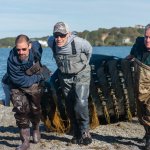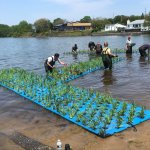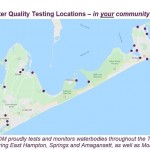IMPROVING Water Quality
Water is the lifeblood of Montauk. It defines who we are as a community. In fact, Montauk has 23 bodies of water – some of which are threatened. To ensure the health of our water bodies, we have introduced and continue to sustain multiple water quality programs and initiatives.
IMPROVEMENT PROJECTS
Septic Upgrade
Elevated nitrogen levels from outdated and ineffective septic systems have led to nitrogen loadings and a proliferation of harmful algal blooms in our waters in recent years. CCOM led the successful effort to expand the Community Preservation Fund to support water quality improvement projects, including septic upgrades. As a result, home and business owners are now able to apply for a East Hampton Town funds to convert to low-nitrogen systems. Additionally, many residents are also eligible for the Suffolk County Septic Improvement Grant Program.
FLOATING WETLANDS | FORT POND
Floating wetlands technology is an innovative solution engineered to enhance the natural process that occurs between water, plants, and microorganisms to remove excess nutrients and contaminants from impaired waterbodies in a passive and natural way.
and natural way.
This unique program uses 7,200 native plants specifically chosen for their ability to thrive in Fort Pond’s environment. The plants are secured in special perforated containers that fit into custom mats designed by family-owned, Florida-based company Beemats Floating Wetlands. As the plants mature, their roots uptake excess nitrogen and phosphorus from the pond as food. The goal is to reduce the “nutrient load” (read the Hofstra University lab analysis report here) in the pond to lessen the extent and severity of the harmful algal blooms (HABs) which have plagued Fort Pond for years.
These floating wetlands are seasonal and reusable. At the end of the growing season, when the plants reach full maturity, the mats are removed from the pond and the nutrient-rich plant material is donated to local community gardens for composting.

This remediation project was first installed in Fort Pond in 2021 and has been reinstalled for the 2023 season. This project has been made possible by a team of dedicated volunteers and grants from the East Hampton Town Community Preservation Fund Water Quality Improvement Program in 2021 and 2022, and from the Long Island Community Foundation in 2023.
Please check out our educational sign located near the corner of Industrial Road and S Edgemere Street.
CLICK HERE to see more photos!
WATER MONITORING PROGRAMS
Over the past several years we have introduced and sustained multiple scientifically based water quality testing initiatives not just in Montauk, but throughout East Hampton Town. Our ongoing water testing is critical to water quality improvement efforts; it provides the data needed to assess current conditions, and to monitor and track the impacts and effectiveness of new projects.
Enterococcus is a bacteria that exists in the guts of warm-blooded animals (birds, humans, and other mammals). Out of concern for declining water quality, CCOM joined Surfrider Foundation’s nationwide Blue Water Task Force in 2013 to start testing enterococcus bacteria levels in Montauk’s waters. Since then, CCOM staff and volunteers have expanded the program and now work year-round collecting water samples in Montauk, Amagansett, and East Hampton, and performing bacterial analysis right in our office lab. On average, during the summer months, we process 30 water samples per week! Sharing our data with the Blue Water Task Force ensures broader outreach and greater environmental and public health.
HARMFUL ALGAL BLOOM (HAB)
In May 2018 CCOM partnered with the Gobler Laboratory at Stony Brook Southampton on an intense harmful algal bloom (HAB) monitoring program in Fort Pond, Montauk. While most algae are harmless and often play an integral part in any aquatic ecosystem, some, like the blue-green algae (cyanobacteria), produce toxins that can be harmful to humans and animals. Such blooms have been detected in Fort Pond every summer since 2015, with 2016 being the only exception.
Previously, testing for HABs in Fort Pond had been sporadic and infrequent, with only a handful of samples taken. Now, every year beginning in early May, weekly samples are taken by CCOM and analyzed by the Gobler Lab, continuing through October. Results are posted to the NYS Department of Environmental Conservation’s HAB Notifications website and are analyzed by NYS and Suffolk County health departments for issuing health or swimming advisories. Weekly testing creates a dataset that will serve as the foundation for establishing the extent of the problem – a first step toward devising an effective solution.
MICROBIAL SOURCE TRACKING
CCOM partnered with the nation’s premier scientific agency, the U.S. Geological Survey (USGS), to restore water quality in Lake Montauk. The USGS uses advanced scientific analysis to track the sources and significance of pollutants – including nitrogen – entering Lake Montauk. Known as “microbial source tracking,” this crucial data will help us implement effective programs supported by advanced scientific analysis that will have measurable improvements in Montauk’s ground and surface waters.
We are able to fund this significant new program because of the remarkable generosity of donors who have supported our Clean Water Challenge, including CCOM Sustainer Circle Members, whose three-year financial commitments help make this program possible. We are also deeply grateful to the Town of East Hampton, which approved significant funding for this initiative.
MONTAUK’S WASTEWATER
CCOM retained Dr. Christopher Gobler, director of the NYS Center for Clean Water Technology at Stony Brook Southampton, to examine approaches and policy options that will best protect Montauk’s water. Our wastewater statement, Advancing Collaborative Solutions for Wastewater Management in Montauk is now available.
